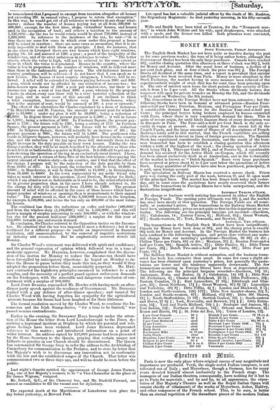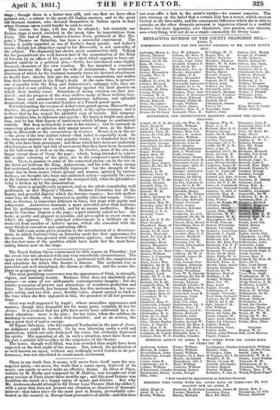tbutrto ault 311.ttoir.
Paris is now the only place where original operas of any magnitude and importance are produced. Verdi, the single noted Italian composer, is not tolerated out of Italy ; and Meyerbeer, though a German, has for many years devoted himself almost exclusively to the French stage. The managers of our Italian theatres, consequently, have nothing for it but to go to Paris for materials • and by and by, to all appearance, the reper- toires of Her Majesty's Theatre as well as the Royal Italian Opera will consist chiefly of rifacimenti of the works of Meyerbeer, Auber, Halevy, and other composers of the French school. This, to be sure, is better than an eternal repetition of the threadbare pieces of the modern Italian stage ; though there is a better way still, and one that we have often pointed out,—a return to the great old Italian masters, and to the great obi German masters, who devoted themselves to Italian opera in days when German opera could hardly be said to exist. This course, we hope, will one day be adopted ; but certainly our Italian stage is much enriched in the mean time by importations from Paris. The last of these, Aubees Gustave Trois, produced at Her Ma- jesty's Theatre on Saturday, has been a successful experiment. The drama is justly regarded as one of Scribe's finest poems; and Auber's music, though not altogether equal to his Masaniello, is not unworthy of the subject. The dramatist has shown great constructive skill. Taking for his groundwork the well-known fact of the assassination of the King of Sweden by an officer of his guard,—a deed which appears to have ori- ginated entirely in a political plot,—Scribe has introduced some highly dramatic elements of his own creation. He has imagined a concealed passion between the King and the wife of Ankarstrom ; the accidental discovery of which by the husband instantly turns his devoted attachment to deadly hate, throws him into the arms of the conspirators, and makes him their instrument in the King's deatli. At the same time, to preserve our sympathy with the King and Ankarstrom's unhappy wife, they are represented as not yielding to but striving against the fatal passion on which their destiny turns. Situations of strong emotion are thus pro- duced; and the progress of the story evolves many of those striking inci- dents, busy and animated scenes, picturesque tableaux, and splendid decorations, which are essential features of a French grand opera. Notwithstanding the success of Aubees two grand operas, Masaniello and Gustave, his proper element, we apprehend, is the opera comique, and it is there that he has reaped his plentiful crop of laurels. His tempera- ment inclines him to lightness and gayety; his fancy is bright and spark- ling, and be has that degree of tenderness which belongs to sentimental comedy. But deep melancholy is not in his nature ; and he succeeds in expressing gloom or agitation only among masses of men, as the fisher- men in Masaniello or the conspirators in Gustave. Hence it is in the air —the glory of the true Italian school—that Auber is especially weak. In the immense number of his very popular works, it is wonderful how few of the airs have been prominent; and those which have been are uniformly of a character so light and full of movement that they have been favourites in the ball-room as well as on the stage. In Gustave, none of the airs are happy except those of Oscar the page; which, being intended to relieve the sombre colouring of the piece, are in the composer's most brilliant vein. There is passion in some of the concerted pieces—as in the trio in the third act between the King, Ankarstrom, and his wife, when strong but restrained emotion is powerfully expressed : but the strength of the music lies in those scenes where groups and masses, agitated by various feelings, are brought into busy and animated action—especially the scene at the fortune-teller's cottage, and the masqued ball, when its splendid re- velry is broken up by the assassination. The opera is magnificently prepared, and on the whole remarkably well performed, at Her Majesty's Theatre. Madame Fiorentini has all the beauty and graceful dignity which the heroine requires : her rich mellow voice has, we think, even improved in quality since last season. Cairo- Ian, as Gustave, is somewhat deficient in force, but sings with purity and refinement. Ankarstrom demands a more powerful actor than Lorenzo, but his performance was careful, and by no means ineffective. Made- moiselle Caroline Duprez is the page—a part entirely suited to her: she looks as pretty and piquant as possible, and gives spirit to every scene in which she appears. Her principal achievement is a brilliant air in- troduced from another of Aubees operas, which she executed with the most finished execution and captivating effect. The ball-room scene gives occasion to the introduction of a divertisse- ment, in which Carlotta Grisi on Saturday made her first appearance for the season. She was greeted with rapturous applause, and showed that she has lost none of the qualities which have made her the most fasci- nating dancer now on the stage.































 Previous page
Previous page